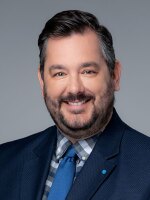People between 45 and 54 have the highest suicide rate in the country. Doctors say untreated depression is the number one risk factor for suicide. But tough economic times can also play a role.
There appears to be a relationship between unemployment and suicide.
For Imperial Beach resident Jessica van der Stad, the beach has special meaning. When she was a little girl, her father brought her to the sand every weekend. Some of her fondest childhood memories took place on a beach.
So it’s ironic that van der Stad was on a beach in 2008, when she got a call from her aunt.
"She said, your dad was found in the backyard of his home with a self-inflicted gunshot wound to the head," van der Stad recalled. "And I guess the words gunshot and wound didn’t register, because I remember asking her, is he okay? And there was just this long pause, and she said, no, your dad is dead."
It was only after he killed himself, that Van der Stad found her father had suffered from depression for decades.
A year before his suicide in 2007, right at the beginning of the recession, Nick van der Stad lost his job and his health insurance.
"So I think that hit him quite hard, more than anything," his daughter Jessica said. "And definitely with the combination of struggling with mental illness already, in particular depression, that impact made the depression worse. And it put him in position that, you know, I’ve had it explained to me, it’s like a black cloud. And that black cloud gets bigger, and bigger, and bigger. And it gets so big and so dark that you can’t see outside of it. And that’s unfortunately what happened to my dad."
Historically, suicide rates rise during economic crises. In fact, suicide rates peaked in the United States during the Great Depression in the 1930s.
Sidney Zisook is a psychiatrist at UC San Diego and the VA Medical Center. He said job losses are another risk factor for suicide.
"A job loss can be an enormous stressor, and may be one of those events that may tip the balance in somebody who otherwise has other suicide risk factors," Zisook pointed out.
Zisook said suicide is a growing problem among middle-aged people.
"We’re seeing the rates of suicide going up in mid-life," he said, "a time when people are not only losing jobs, but also really beginning to have concerns about retirement, retirement benefits, and their ability to maintain themselves at a time when their health may be failing, etcetera."
The recession has left millions of people unemployed and poor.
In fact, the U.S. Census Bureau says nearly three out of five Americans living in poverty are of working age.
So what can people do to prevent someone from going off the edge?
Mental health professionals say family members can play a key role in helping to prevent suicides.
They can look for some of the warning signs, like a sense of hopelessness, increased substance abuse, and veiled threats.
San Diego family therapist David Peters said people need to speak up if they’re concerned.
"And it’s okay to ask your loved one: Hey, are you okay? What’s going on in your mind? Are you thinkin’ of hurtin’ yourself? Do I have to worry about you committing suicide? Those questions we don’t ask one another," Peters said. "They’re taboo. But if you don’t ask, you don’t know."
Jessica van der Stad said her dad became very withdrawn and closed off before he killed himself three years ago. Looking back, she wishes she had known those were red flags.
"When you don’t have that education, when you don’t know those signs, in the moment, you don’t realize that is a call for help," van der Stad said.
Van der Stad was so affected by her father’s death, she now works for the American Foundation for Suicide Prevention.







